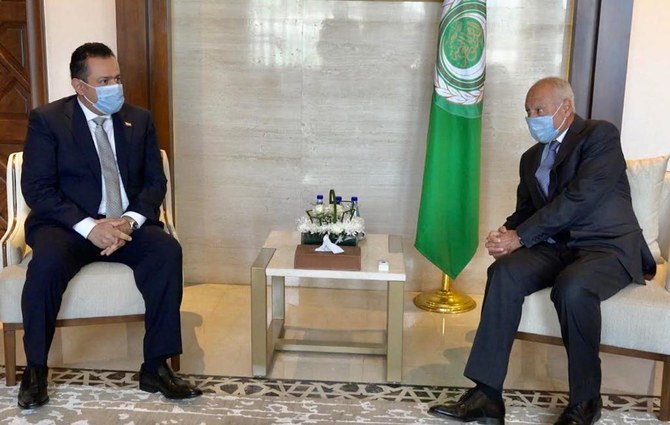DUBAI: A political agreement is the only solution to solve the crisis in Yemen, Arab League Secretary-General Ahmed Aboul Gheit said.
Prime Minister Maeen Abdulmalik discussed Yemen’s support of the Arab League’s role in handling significant issues of the Arab countries in a meeting held in Cairo with Aboul Gheit, state news agency SABA reported.
Aboul Gheit said it was important to preserve Yemen’s sovereignty, adding that a political agreement will guarantee the country’s independence.
He also discussed the importance of strengthening the government’s capabilities in tackling dangerous situations including the health sector.
Both sides reviewed the latest developments in Yemen including the Arab League’s rejection of Iranian interference in the region, and the security of the Bab Al-Mandab Strait and the Red Sea.
Arab League Secretary-General discusses Yemeni crisis developments with PM
https://arab.news/46ug9
Arab League Secretary-General discusses Yemeni crisis developments with PM

- Aboul Gheit said it was important to preserve Yemen’s sovereignty, adding that a political agreement will guarantee the country’s independence
Lebanon condemns deadly Israeli strikes on south and east

BEIRUT: Lebanon’s president on Saturday condemned deadly Israeli attacks on his country carried out a day prior, the latest despite a ceasefire with militant group Hezbollah.
In a statement, Joseph Aoun called the attacks “a blatant act of aggression aimed at thwarting diplomatic efforts” by the United States and other nations to establish stability.
A lawmaker from Hezbollah called on Beirut to suspend meetings of a multinational committee tasked with monitoring the truce.
Washington is one of five members on the committee overseeing the ceasefire implemented in November 2024, with the body scheduled to meet again next week.
Israel has repeatedly bombed Lebanon despite the ceasefire, usually saying it is targeting Hezbollah but occasionally also the group’s Palestinian ally Hamas.
The Friday attacks on southern and eastern Lebanon killed 12 people, according to the health ministry, 10 of them in the east of the country.
Israel’s military said it struck “several terrorists of Hezbollah’s missile array in three different command centers in the Baalbek area.”
Hezbollah said a commander was killed in the raids. Its lawmaker Rami Abu Hamdan said on Saturday the group “will not accept the authorities acting as mere political analysts, dismissing these as Israeli strikes we have grown accustomed to before every meeting of the committee.”
He called on Beirut to “suspend the committee’s meetings until the enemy ceases its attacks.”
Hezbollah, while weakened following war with Israel, remains a strong political force in Lebanon represented in parliament.
Lebanon’s government last year committed to disarming the group, with the army saying last month it had completed the first phase of the plan covering the area near the Israeli border.
Israel, which accuses Hezbollah of rearming since the war, has called the Lebanese army’s progress on disarming the militant group insufficient.












